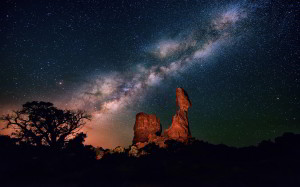Science Seen Physicist and Time One author Colin Gillespie helps you understand your world.
Whose idea?
After I stumble on the answer to the question of how the universe began, I’m sweating what to do next. I figure that another question―Whose discovery is it?―should point me to the answer.
It would be pure conceit to think that it is mine alone. I just sorted through the thoughts of others, starting with those of the giant, Einstein, choosing some and stitching them together in a novel order.
This discovery, maybe more than any other, is the work of countless people. Like sages through the ages, only few of whom I can identify by name. Like those who boosted science into space. Like our ancestors, who in their billions played their parts in shaping language for our thoughts (as language is the lifeblood of ideas).
In all the years I sought an answer to the universal question I gave no thought to what I would do with it. I simply had a need to understand it for myself. But now I see this understanding needs to be available to all.
Over the years, the physicist has morphed through biophysicist into (unlikely though it seems) a lawyer. And now, it seems, an author. Of course it’s not that simple. In the past I’ve written for the eyes of sundry experts; now I need to write for general readers.
The more I think of this the more it shapes up as a challenge. Like: What new words are needed so that we can think about the new ideas? Where will we find them?
Related reading:
Derek Bickerton (2009), Adam’s Tongue, New York: Hill & Wang; http://us.macmillan.com/adamstongue/DerekBickerton
W. Tecumseh Fitch (2010), The Evolution of Language, New York: Cambridge University Press; http://www.cambridge.org/us/academic/subjects/languages-linguistics/evolution-language/evolution-language


No comments yet.